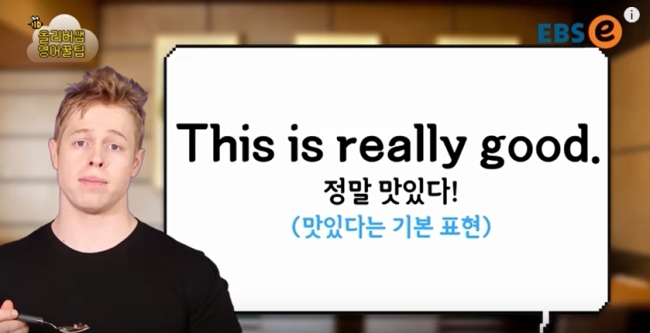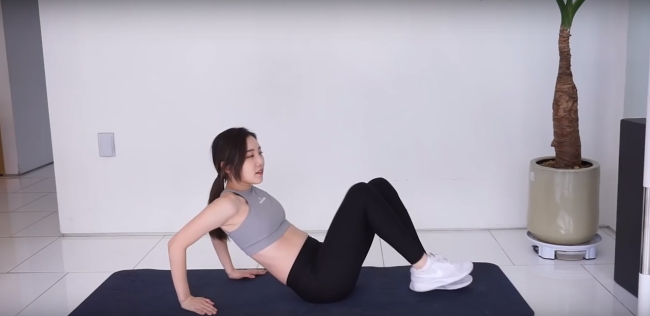Imagine the shock when a boy, 8, drove up to a local McDonalds drive-through and asked for a Happy Meal.
The news of the Ohio boy who learned how to drive on YouTube to get a late-night snack was a cutesy tidbit, but it also demonstrated just how easy it has become to educate oneself via new media.
“With the way technology is, more kids will learn how to do anything and everything,” a local patrolman told the Weirton Daily Times, upon witnessing the boy obeying all traffic laws and driving “effortlessly” through downtown.

A screengrab from YouTuber Oliver Grant’s show teaching English phrases used in everday life. (YouTube)

A screengrab from YouTuber Oliver Grant’s show teaching English phrases used in everday life. (YouTube)
A considerable portion of the barrage of information flooding the internet is helpful -- as it was for the world’s youngest model driver -- and an increasing number of Koreans are taking advantage of living in the world’s most wired country by educating themselves with information available online.
Most often, the learning occurs via video-sharing website YouTube, ranging from simple English lessons to how to take better care of your body.
Oliver Grant, also known as Oliver sam (sam is Korean slang for teacher), runs an English education channel on YouTube. But Grant’s channel does not focus on grammar and vocabulary, but on various expressions of the language and how it is used in daily life.
One video titled “Why you won’t always hear people say ‘delicious’ in America” explains expressions related to food that people can use in the US.
“The majority of the students I taught in Korea really disliked the textbooks we were using. ... I’d take the core lesson of a section we were learning and make more entertaining PPTs and games to get the students engaged in the language,” said Grant, who has taught English in Korean public schools.
English education in Korea is notorious for focusing on rote memorization and written tests. A well-known joke here is about a Korean run over by a car in the US who, upon being asked “Are you ok?” answers, “I’m fine, thank you. And you?”
The joke is an exaggeration, but the relative shortage of opportunities to engage in conversations with English-speaking people is a hurdle for English learners.
“I thought that doing short video clips on common mistakes my students were making in an entertaining manner was a good way to supplement their studies,” Grant said.
Unlike schools, the advantage of the new media is that there is no limit to what subjects are covered.

A screengrab from Kim Su-jin’s YouTube show on workout and makeup tips. (YouTube)
Kim Su-jin, better known by her YouTube nickname Miss Daisy, runs a channel on makeup and exercise programs viewers can try at home.
“I think one of the advantages of learning via YouTube is that people can look up information they want and like, whenever they want to,” she said.
Podcast is also a popular platform for self-learners. “Ilsan Opa’s Applied Music 101” is a popular podcast show that teaches the basics of harmonics.
Several podcast shows also teach English via easily-accessible English news.
Some educators attempt to supplement their classes with podcasts. For instance, “Banmyeongyosa” by teachers and students from Gangseo High School in Ansan, Gyeonggi Province, has students engaging in various topics.
According to teacher Ryu Gang-jun, the podcast was intended to provide a forum for students to freely discuss important issues in education and society.
While the show is not a typical educational podcast, it shows how new media can be used in education.
Users say the biggest advantages of new media learning is its accessibility and that it is free.
“I started studying music relatively late, and I didn’t know where to start because harmonics was such a new concept to me. Being able to choose what to study and when to study is really helpful to newcomers like me,” said a subscriber of “Ilsan Opa.”
Ha Ji-won, a YouTuber who teaches video editing under the name “JWVID,” said new media allows users to focus on learning.
“I think it is a great platform for those who emphasize the essentials of education. It’s not about degrees or grades; it’s about the learning process itself,” he said.
Grant said YouTube learning has the advantage of having an exponentially expansive list of “how to” videos spanning across virtually all fields.
“I never even knew how to wear a tie. It’s a great advantage that people can look up anything, from simple things to something like Einstein’s theories,” he said.
By Yoon Min-sik (
minsikyoon@heraldcorp.com)





![[Herald Interview] 'Amid aging population, Korea to invite more young professionals from overseas'](http://res.heraldm.com/phpwas/restmb_idxmake.php?idx=645&simg=/content/image/2024/04/24/20240424050844_0.jpg&u=20240424200058)


